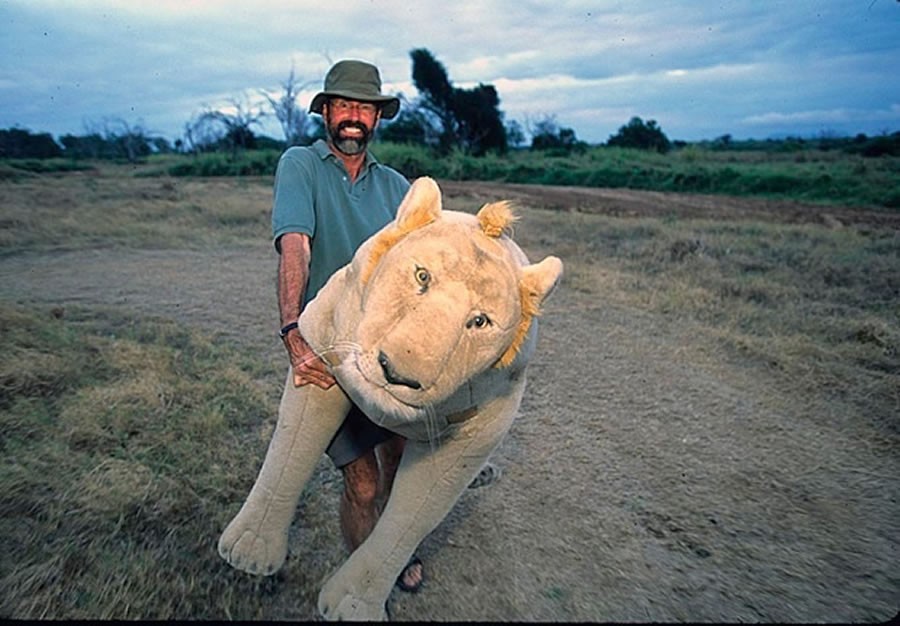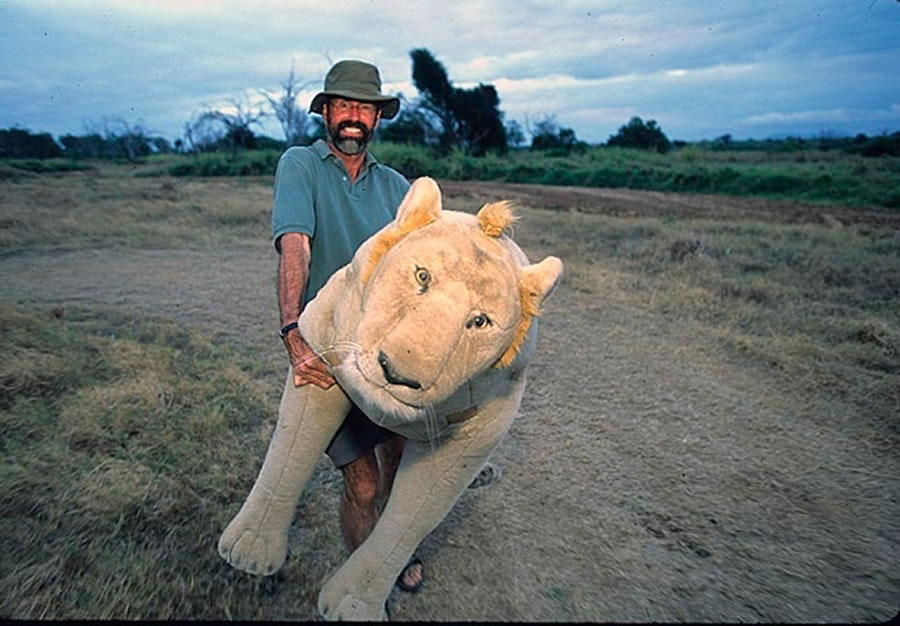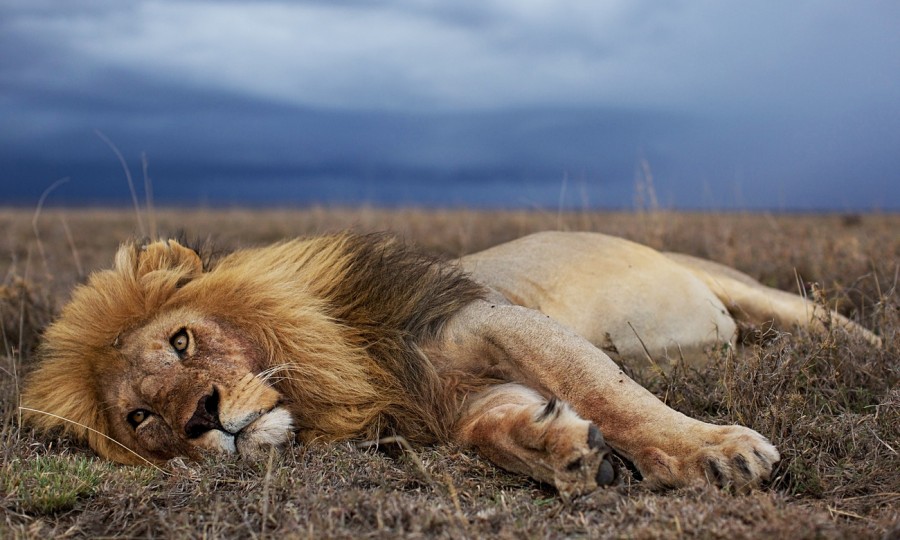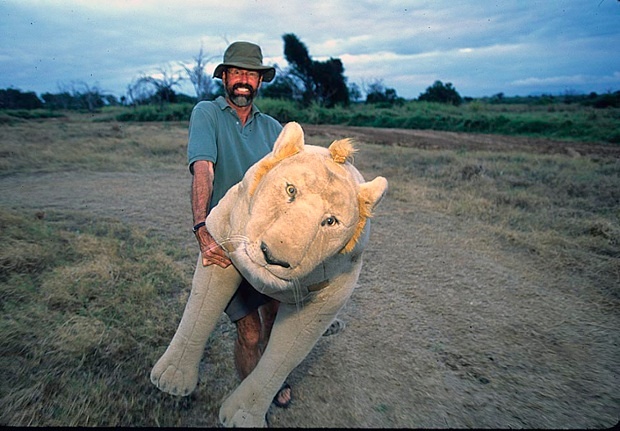
Craig Packer: “Cecil the Lion’s Killer was Unlucky and not Altogether to Blame”
The ecologist and author Craig Packer has spent 30 years researching the overhunting of lions in Africa and is deeply pessimistic about their future. Here he talks about dishonest hunting operators, the urgent need for global money, why he takes issue with animal groups – and what we’ve learned from Cecil. Craig Packer likes sticking […]

The ecologist and author Craig Packer has spent 30 years researching the overhunting of lions in Africa and is deeply pessimistic about their future. Here he talks about dishonest hunting operators, the urgent need for global money, why he takes issue with animal groups – and what we’ve learned from Cecil.

Craig Packer likes sticking his shaggy academic head into dangerous places. He’s had death threats, confronted megalomaniac politicians, been run out of countries and mugged. But the man who has spent 30 years trying to study and save lions came close to real fear last month.
As the world’s media worked themselves into a tizz over the American dentist who paid $50,000 to shoot Cecil the lion in Zimbabwe, Packer happened to have severe toothache, which forced him to seek treatment in Minneapolis, where he directs the Lion Research Centre at the university.
“And what do you do?” asked the dentist, drill in hand.
“Oh, I study lions…”
There was an uncomfortable pause, Packer says. “Suddenly I felt very vulnerable. This is a class of people who can cause significant pain…”
One room [of a billionaire lion hunter] had two large elephants, 10 leopards, six hyenas, and 15 dead lions.
Packer got out alive, just as he did when invited to meet Steven Chancellor, the billionaire lion hunter and leading donor to the Bush 2004 presidential campaign. He had been seeking better regulation of trophy hunting in Tanzania and got a tour of the big game hunter’s mansion. One room had two large elephants, 10 leopards, six hyenas, and 15 dead lions.
The tableau of death was chilling, he writes in his new book. “The lions are all busy… At least three pairs are working together to pull down various prey while a larger group is stalking an eland. It is like a workout room at a gym, but nothing moves… At the end of the tour I have seen at least 50 lions.”
“As you can see, I have a special love of lions,” Chancellor told him.
Packer bit his lip and left. “I was numb. When I see an animal, I want to know what it’s about to do next. They lead the most interesting lives. But no matter how lifelike Chancellor’s stuffed animals, they were all frozen in death. They had all been reduced to mere reflections of him.”
“Trophy hunting is not inherently damaging to lion populations, provided the hunters take care to let the males mature and wait to harvest them after their cubs are safely reared. The dentist was unlucky and not altogether to blame.
The global population [of lions] has dropped to under 30,000 from 100,000 in the 1980s…
After 30 years researching the overhunting of lions in Africa, Packer is profoundly pessimistic about their future. The figures are stark. The global population has dropped to under 30,000 from 100,000 in the 1980s; there are fewer than 2,000 left in Kenya, only 2,800 wild lions in South Africa, and numbers have declined 66% in 15 years in Tanzania. Yet hunters are invited to kill thousands every year and vast tracts are reserved for hunting.
Their long-term survival, he says, depends on big money coming in to protect them. But counterintuitively, he says, trophy hunters like Chancellor or the dentist are also needed.
“Trophy hunting is not inherently damaging to lion populations, provided the hunters take care to let the males mature and wait to harvest them after their cubs are safely reared. The dentist was unlucky and not altogether to blame.
“Trophy hunters are no angels but they actually control four times as much lion habitat in Africa than is protected in national parks; and 80% of the world’s lions left in the world are in the hunters’ hands.”
“Clients like the dentist are just tourists. They believe whatever they are told. It’s extremely unlikely that [the dentist] knew anything about that particular lion or even how close he was to the national park when he shot it. It’s common practice in Zimbabwe for hunting operators to draw lions out of the parks so their clients can shoot them.”
However much he scorns the city slickers who spray bullets at anything with fangs, he insists he is not waging war on controlled hunting.
The problem is the companies are under extreme pressure to provide big male lions for their clients, and the industry is sleazy and corrupt. Some professional hunters engage in double hunting, where they let their clients exceed the quota of lions they can kill and then bury the less impressive lion; others will shoot a buffalo before the client arrives to bait a site to attract a lion so it can be easily shot on day one.
Professional hunters are mostly working-class kids from South Africa, white Kenyans, French, Brits.
“If you are well connected you don’t even have to pay the government. Professional hunters are mostly working-class kids from South Africa, white Kenyans, French, Brits. These guys are pros but there is no oversight or accountability.
“The corrupt companies all have connection with government. They are ruthless. The good ones fear that they will not be able to carry on if I name them. Hunting in Tanzania has been a bad thing. Kenya is just as bad.”
The hunting industry argues that its money goes to conservation, but Packer rejects this. “Hunters lie and the industry greatly exaggerates its ‘positive’ impact on wildlife conservation,” he says.
“A lot of clients head off into the bush believing that their $50,000 will save the world – when in fact virtually none of that money goes to conservation and the true costs of conservation are far higher. [With Cecil] the hunters paid a small fine to the Zimbabwean government, while the dentist became the international scapegoat.

“[Yet] hunting could well provide the best possible incentive for conserving vast tracks of land. Lions occupy the top of the pyramid. If hunters take care of entire ecosystems – the land, the plants and the herbivores – they would be rewarded with healthy numbers of lions.
“I get hunting. It’s done a lot for conservation in North America. Done well, it’s good for preserving wildlife and can be a valuable wildlife management tool. I grew up in Texas. I used to shoot ducks, rabbits, birds for the pot.”
Packer – who first went to Tanzania to study baboons with [British primatologist] Jane Goodall, and whose field research on lion manes, the colouring of noses and overhunting has provided countries with the science to regulate lion conservation – has come to identify with the animals he researches.
“Lions sit around doing nothing for long periods of time, then they get up and do the most amazing things, like catch a buffalo or chase off their neighbours. This seems like a life well-lived. I endure long periods of teaching, writing grants, dealing with bureaucrats, then I’ve had the good fortune to experience the most amazing things.
“And like lions, I have my own social group, and the greatest rewards have come from working with family and my research team. The secret of lion society is mutual respect – there’s no real dominance hierarchy between the females or within most male coalitions – which seems the best way to collaborate with the people in my life.”
“Animal groups tend to [seem] religious. It feels like a theology.”
The hunters may be liars, but he has little truck either with the religious fervour and sentimentality of the animal lovers.
“Animal groups tend to [seem] religious. It feels like a theology. I get into conflict with everyone. I like fences. Animal lovers hate fences. I tell hunters, ‘you guys lie’. There are two sides to every argument and both sides are right on certain points.”
The Cecil episode was instructive because, as a scientist, he finds the whole idea of naming lions bizarre. “There are lots of Cecils out there. Just last week one of my students reported a spearing of a lion by a Maasai. It had no name. Normally lions are called things like MH3T or lion LGB.
“The Cecil story tells me that we as a species can only show empathy with individual organisms. The question is how do you fire up the same concerns for populations? It’s frustrating.
…he finds the whole idea of naming lions bizarre…
“But Cecil did fire people up. It brought awareness and raised issues like should lions be on the endangered species list or should the EU ban trophies from certain African countries?”
Cecil also helped open doors for Packer to lobby the US and EU for control of trophy imports. “Since Cecil, I have had auditions with local congresswomen. Frankly, the US Fish and Wildlife Service has been blase about lions. They have downplayed the damage that lion hunting inflicts. I have also asked the EU to take into account that Tanzania is corrupt and they should consider banning all trophies from there.”
Watch archive footage of Cecil the lion at Zimbabwe’s Hwange national park:
The root causes for the cataclysmic decline of wildlife in Africa, he says, are funding and population pressure.
“Cecil should not have been shot for $50,000. They should have charged $1m.” – Craig Packer
“Wildlife just does not have enough value. Cecil should not have been shot for $50,000. They should have charged $1m. Trophy hunting only provides a very small fraction of the money for conservation.”
He favours the South African system of conservation, with wildlife effectively kept behind fences and strict regulation and demarcation of land. It may feel controlled and overmanaged, but it works, he says – and people do not get killed.
“People are not going to magically stop killing lions. You can’t expect communities to accept lots of people being killed each year by lions.”
The wider solution, he says, is for the world to recognise that the great African wildlife reserves are true world heritage sites and that their protection should be paid out of global funds.
“They are world treasures yet Unesco gives no money – there’s no revenue at all. Photo tourism is not enough. If you go to Yosemite you will be charged a nominal entry fee. That does not cover costs, but [Americans] are paying for Yosemite with [their taxes]. The west has the tax base to cover the costs but Africa has the poorest people and no revenue.
“We cannot expect wildlife to pay its way.”
“We cannot expect wildlife to pay its way. I am now goading people to engage organisations like Unesco and the World Bank to recognise that if we are to keep the [wildlife], the global community must pay for them. That is my crusade. A lot of people have been duped into thinking that just by being a tourist or a hunter, it is enough. It’s not.
“If the giga-bucks do not come, then there is no hope. I have resigned myself to the fact that in 50 years, the only places in Africa that will be worth going to [for wildlife] will be Botswana, Namibia and South Africa. All the rest will be gone.”
Lions in the Balance: Man-Eaters, Manes and Men With Guns by Craig Packer is published by Chicago University Press (£24.50). Click here to order a copy
This article first appeared in The Guardian and is republished here with kind permission of John Vidal and Craig Packer.
